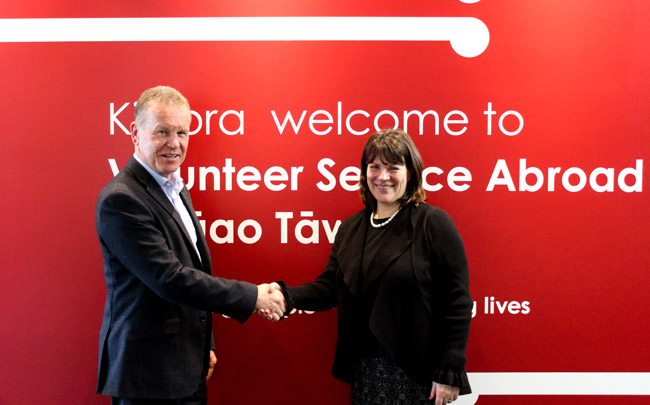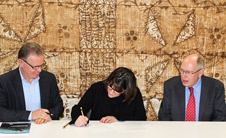 Friday 25 May 2018 1:46pm
Friday 25 May 2018 1:46pm
Volunteer Service Abroad (VSA) CEO Stephen Goodman and University of Otago Vice-Chancellor Professor Harlene Hayne shake hands after signing a Memorandum of Understanding between the two organisations in Wellington.

Vice-Chancellor Professor Harlene Hayne (centre) signs the MOU, while Volunteer Service Abroad (VSA) CEO Stephen Goodman (left) and Otago Geography Professor Tony Binns (right) look on.
An initiative that has enabled more than 100 mostly geography students from Otago University to carry out voluntary work abroad since 2006 has been given a new lease on life, following the signing of a Memorandum of Understanding (MOU) by Vice-Chancellor Professor Harlene Hayne in Wellington this week (today).
The MOU, between the Volunteer Service Abroad (VSA) organisation and the University, extends the life of the UniVol programme at Otago. The programme allows third-year and postgraduate students to go to Pacific region countries on 10-month placements working on a variety of community-based development projects in the Pacific region.
Professor Hayne says the retention of this very successful programme and signing of the MOU means ongoing fantastic and important life-changing experiences for Otago students.
“I believe the relationship between Otago and VSA can only go from strength to strength. The possibility of undertaking future collaborative research projects is particularly exciting,” she says.
The MOU is now in place indefinitely, until next reviewed, and ensures protocols between the two organisations related to placements in foreign countries for students are maintained; and also that there is collaboration between the two bodies on research projects, and that Otago staff can also participate as volunteers.
The document says:
- Otago University employees and/or students will gain hands-on experience of working in communities in developing countries in the Pacific and wider region.
- VSA will draw on the skills and experience of Otago University employees and/or students, and will benefit from working with a recognised New Zealand tertiary education institution.
Geography Professor Tony Binns, who played a leading role in setting up the UniVol programme during 2005 and 2006, says he is proud of the programme's success, and delighted that VSA wants to continue this.
“The signing of a new MOU reinforces and widens the collaborative relationship between Otago University and VSA. The programme is a highlight of my career, and has been praised for its effectiveness by the Ministry of Foreign Affairs and Trade, students and the host placements,” he says.
“The success of the UniVol programme has recently been underscored in the Geography Department PhD Thesis of Sam McLachlan, Relationships Matter: The role and impact of younger international development volunteers. Sam McLachlan was himself a UniVol based in East London, South Africa (2008) and his thesis represents a detailed and objective evaluation of the UniVol programme and its impact on host communities and volunteers.”
For the first five years of the programme, UniVols came only from the Department of Geography at Otago. Then it was agreed to include Geography and Development Studies students from Victoria, Massey and Auckland Universities.
Professor Binns says a 10-month overseas placement to a developing country often changes the lives and perceptions of young people and helps to develop empathy and understanding for people and situations frequently very much worse off than here in New Zealand.
“Returned volunteers report on having experiences which will stay with them for the rest of their lives. Many of the volunteers develop long-lasting relationships and continue to visit their overseas friends long after their placement is over.”
For further information, contact:
Professor Tony Binns
Department of Geography
University of Otago
Tel 03 479 5356/8773